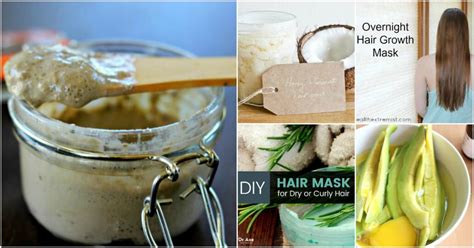Indulge in the transformative power of nature with these DIY natural hair masks. Crafted from nutrient-rich ingredients, these masks promise to restore vitality, enhance growth, and leave your locks feeling silky smooth.

Why Opt for Natural Hair Masks?
Natural hair masks offer a host of benefits that synthetic products often lack:
- Nourishment: Packed with vitamins, minerals, and antioxidants, organic ingredients deeply nourish the hair and scalp, promoting overall hair health.
- Moisturization: Natural oils and butters provide intense hydration, combating dryness and preventing split ends.
- Strengthening: Nutrient-dense ingredients help strengthen hair follicles, reducing breakage and increasing hair elasticity.
- Versatile: Natural masks can be customized to suit specific hair types and concerns, ensuring optimal results.
Choosing Ingredients for Your Natural Hair Mask
Consider your hair type and specific needs when selecting ingredients. Here are some popular options:
- For Dry Hair: Avocado, coconut oil, shea butter, honey
- For Oily Hair: Lemon juice, apple cider vinegar, green tea
- For Damaged Hair: Banana, yogurt, eggs, aloe vera
Step-by-Step Guide to Making Your Own Natural Hair Mask
- Gather your ingredients: Choose ingredients that match your hair type and needs.
- Prepare the ingredients: Puree or mash fruits, vegetables, and other ingredients to create a smooth paste.
- Combine the ingredients: Mix all ingredients thoroughly to create a cohesive mask.
- Apply the mask: Section your hair and generously apply the mask from roots to tips.
- Massage: Gently massage the mask into your scalp and hair to promote absorption.
- Leave in: Allow the mask to sit for the recommended time (typically 15-30 minutes).
- Rinse: Rinse your hair thoroughly with warm water to remove the mask.
- Style: Style your hair as usual after the mask treatment.
4 Natural Hair Mask Recipes to Try
1. Banana Honey Mask (for Dry Hair)
- 1 ripe banana
- 1 tablespoon honey
- 1 tablespoon olive oil
2. Apple Cider Vinegar Rinse (for Oily Hair)
- 1 cup apple cider vinegar
- 1 cup water
3. Yogurt Egg Mask (for Damaged Hair)
- 1 cup plain yogurt
- 2 eggs
- 1 tablespoon coconut oil
4. Avocado Aloe Vera Mask (for All Hair Types)
- 1 ripe avocado
- 1 cup aloe vera gel
- 1 tablespoon argan oil
Table 1: Hair Mask Matrix for Different Hair Types
| Hair Type | Recommended Ingredients |
|---|---|
| Dry | Coconut oil, shea butter, avocado, honey |
| Oily | Green tea, apple cider vinegar, lemon juice |
| Damaged | Yogurt, eggs, banana, aloe vera |
| Normal | Argan oil, jojoba oil, rosemary essential oil |
Table 2: Frequency of Hair Mask Use
| Frequency | Hair Type |
|---|---|
| Weekly | Dry, damaged, colored hair |
| Biweekly | Normal hair |
| Monthly | Oily hair |
Table 3: Benefits of Natural Hair Masks
| Benefit | Ingredients |
|---|---|
| Nourishment | Vitamins, minerals, antioxidants |
| Moisturization | Oils, butters |
| Strengthening | Proteins, amino acids |
| Damage Repair | Antioxidants, humectants |
| Scalp Health | Antibacterial, antifungal ingredients |
Table 4: Tips for Using Natural Hair Masks
- Use fresh and unprocessed ingredients for optimal efficacy.
- Adjust ingredient proportions to suit your hair’s specific needs.
- Protect your clothes from spills with an apron or towel.
- Apply hair masks evenly to avoid product buildup.
- Rinse hair thoroughly to prevent product residue.
- Avoid using heat styling tools immediately after a hair mask treatment.
Innovative Applications for Natural Hair Masks
- Leave-in Conditioner: Apply a diluted hair mask to your damp hair and leave in for 15 minutes before rinsing. This method provides lasting hydration and nourishment.
- Hair Primer: Use a thin layer of hair mask as a primer before applying heat protectant products. This creates a barrier that reduces heat damage.
- Scalp Treatment: Apply hair masks directly to your scalp for targeted nourishment and exfoliation. Massage gently to stimulate circulation.
- Face Mask: Repurpose your natural hair mask as a gentle and nourishing face mask. The hydrating ingredients soothe and hydrate skin.
Conclusion
Embracing natural hair masks is a transformative way to elevate your hair care routine. These nutrient-rich formulations nourish, revitalize, and protect your tresses, leaving them looking and feeling their best. Experiment with different recipes to find the perfect match for your unique hair needs.
